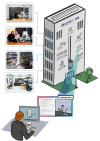Differences
This shows you the differences between two versions of the page.
| Both sides previous revisionPrevious revisionNext revision | Previous revisionNext revisionBoth sides next revision | ||
| team:daniel_nyga [2013/06/25 13:57] – [About] nyga | team:daniel_nyga [2013/09/09 09:57] – nyga | ||
|---|---|---|---|
| Line 4: | Line 4: | ||
| |::: ||Research Staff\\ \\ || | |::: ||Research Staff\\ \\ || | ||
| |:::|Room: |1.77| | |:::|Room: |1.77| | ||
| - | |:::|Tel: |--49 -421 218 64039| | + | |:::|Tel: |--49 -421 218 64008| |
| |:::|Fax: |--49 -421 218 64047| | |:::|Fax: |--49 -421 218 64047| | ||
| |:::|Mail: |< | |:::|Mail: |< | ||
| Line 10: | Line 10: | ||
| ====About==== | ====About==== | ||
| - | Before I joined the Institute for Artificial Intelligence, | + | Before I joined the Institute for Artificial Intelligence, |
| + | |||
| + | I'm working on the import of action-specific knowledge from the World Wide Web into the knowledge bases of our mobile robots. In particular, my current research focuses on understanding natural language, in order to enable a robot to autonomously acquire new high-level skills by querying web pages such as eHow.com or wikiHow.com. | ||
| My work aims at building up action-specific knowledge bases from various knowledge sources, such as natural language, interactive computer games, observations of humans performing everyday activity or experience data of a robot. | My work aims at building up action-specific knowledge bases from various knowledge sources, such as natural language, interactive computer games, observations of humans performing everyday activity or experience data of a robot. | ||
| - | {{people:nyga: | + | {{research: |
| Knowledge about actions and objects is represented as // | Knowledge about actions and objects is represented as // | ||
| Line 38: | Line 40: | ||
| * Web-enabled Learning of Models for Word Sense Disambiguation (Bachelor Thesis, Stephan Epping) | * Web-enabled Learning of Models for Word Sense Disambiguation (Bachelor Thesis, Stephan Epping) | ||
| * Grounding Words to Objects: A Joint Model for Co-reference and Entity Resolution Using Markov Logic Networks for Robot Instruction Processing (Diploma Thesis, Florian Meyer) | * Grounding Words to Objects: A Joint Model for Co-reference and Entity Resolution Using Markov Logic Networks for Robot Instruction Processing (Diploma Thesis, Florian Meyer) | ||
| + | |||
| + | ====Open Positions==== | ||
| + | Studentische Hilfskraft im Bereich Wissensrepräsentation und | ||
| + | Sprachverstehen für intelligente autonome Roboter gesucht. | ||
| + | |||
| + | Im Rahmen des europäischen Forschungsprojektes RoboHow.Cog [1,2] | ||
| + | werden Methoden erforscht, um Wissen aus unterschiedlichen Quellen | ||
| + | (z.B. Videos, Text, Computerspiele und kinästhetische Demonstration) | ||
| + | miteinander zu verknüpfen, | ||
| + | selbstständig ihr Repertoire an Fähigkeiten (wie z.B. die | ||
| + | Zubereitung von Pfannkuchen) zu erweitern. | ||
| + | |||
| + | Die Arbeitsgruppe für Künstliche Intelligenz (ai.uni-bremen.de) der | ||
| + | Uni Bremen sucht ab sofort eine studentische Hilfskraft für die | ||
| + | Entwicklung und Integration von probabilistischen Methoden der KI, | ||
| + | die es autonomen Haushaltsrobotern ermöglichen, | ||
| + | Instruktionen aus Rezepten im World Wide Web zu verstehen und | ||
| + | auszuführen. | ||
| + | |||
| + | Die HiWi-Tätigkeit kann auch als Ausgangspunkt für weitere Bachelor-, | ||
| + | Diplom- oder Masterarbeiten dienen. | ||
| + | |||
| + | Aufgaben: | ||
| + | * Implementierung einer Schnittstelle für das Robot Operating System (ROS), | ||
| + | * Anbindung der Wissensbasis an das Ausführungsmodul des Roboters | ||
| + | * Unterstützung der wissenschaftlichen Mitarbeiter bei der Erweiterung und Integration der Roboterplattform PR2. | ||
| + | |||
| + | Kompetenzen: | ||
| + | * Informatikstudium (Bachelor, Master oder Diplom) | ||
| + | * Grundkenntnisse im Bereich Künstliche Intelligenz | ||
| + | * Grundkenntnisse im Bereich Wahrscheinlichkeitstheorie | ||
| + | * Grundkenntnisse im Bereich Maschinelles Lernen | ||
| + | * Programmierkenntnisse in den Sprachen Python u. Java | ||
| + | |||
| + | Ausgeschriebene Stundenzahl: | ||
| + | |||
| + | [1] www.robohow.eu\\ | ||
| + | [2] http:// | ||
| + | |||
| + | |||
| ====== Publications ====== | ====== Publications ====== | ||
Prof. Dr. hc. Michael Beetz PhD
Head of Institute
Contact via
Andrea Cowley
assistant to Prof. Beetz
ai-office@cs.uni-bremen.de
Discover our VRB for innovative and interactive research

Memberships and associations:











